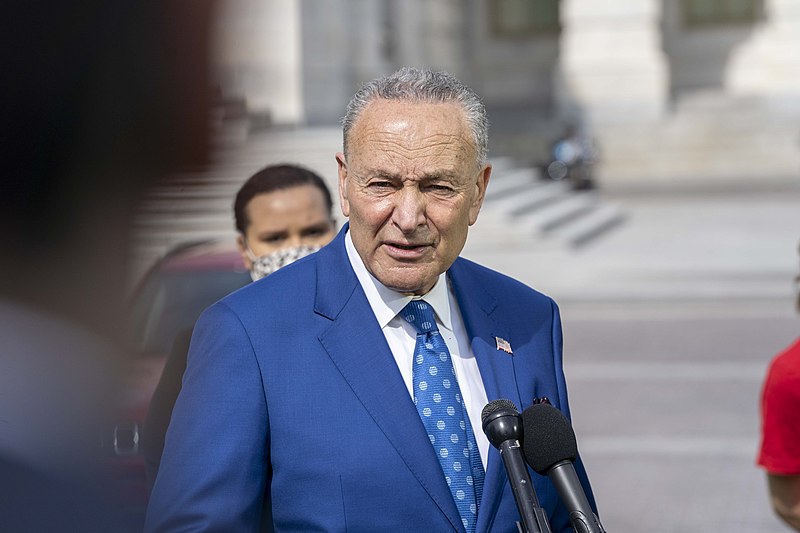Senate Majority Leader Chuck Schumer said a committee is considering legislation next week that would repeal two authorizations for previous wars in Iraq. The legislation comes as Congress looks to reassert its role in deciding when to deploy troops to combat.
Schumer said on Wednesday that the Senate Foreign Relations Committee, chaired by Democratic Senator Bob Menendez, will take up the legislation to repeal the 1991 and 2002 Authorizations for the Use of Military Force. Schumer said this would clear the way for a possible full vote in the Senate before lawmakers leave for the April recess. A bipartisan group of lawmakers from the Senate and the House introduced the legislation in early February.
“We need to put the Iraq war squarely behind us once and for all, and doing that means we should extinguish the legal authority that initiated the war to begin with,” said Schumer.
Lawmakers in Congress have long argued that the legislative branch has ceded too much authority to the president over whether troops should be deployed into combat in passing, then failing to repeal open-ended war authorizations that presidents over the years have used to justify military action around the world.
The US Constitution cites that Congress, not the president, has the authority to declare war.
However, the chances of the legislation getting passed remain to be seen as members of Congress are also still divided over whether it is beneficial for national security to let the AUMFs remain, which would leave the situation to military commanders to decide how to fight US enemies or insisting that AUMFs pass before the old authorizations end.
On Thursday, a bipartisan group of 12 senators reintroduced the legislation that would make Daylight Savings Time permanent, almost a year after the chamber unanimously voted to end switching clocks. The Senate voted to end the biannual adjustment of clocks under Daylight Savings Time in the US, which was supported by advocates of brighter afternoons and added economic activity.
Despite the legislation’s passage in the Senate, the bill failed to pass the House as lawmakers could not agree on whether to keep the standard time or permanent daylight savings time, according to Democratic Rep. Frank Pallone.



 U.S. Lawmakers to Review Unredacted Jeffrey Epstein DOJ Files Starting Monday
U.S. Lawmakers to Review Unredacted Jeffrey Epstein DOJ Files Starting Monday  Trump Endorses Japan’s Sanae Takaichi Ahead of Crucial Election Amid Market and China Tensions
Trump Endorses Japan’s Sanae Takaichi Ahead of Crucial Election Amid Market and China Tensions  India–U.S. Interim Trade Pact Cuts Auto Tariffs but Leaves Tesla Out
India–U.S. Interim Trade Pact Cuts Auto Tariffs but Leaves Tesla Out  Ohio Man Indicted for Alleged Threat Against Vice President JD Vance, Faces Additional Federal Charges
Ohio Man Indicted for Alleged Threat Against Vice President JD Vance, Faces Additional Federal Charges  Trump Says “Very Good Talks” Underway on Russia-Ukraine War as Peace Efforts Continue
Trump Says “Very Good Talks” Underway on Russia-Ukraine War as Peace Efforts Continue  South Korea Assures U.S. on Trade Deal Commitments Amid Tariff Concerns
South Korea Assures U.S. on Trade Deal Commitments Amid Tariff Concerns  Trump Lifts 25% Tariff on Indian Goods in Strategic U.S.–India Trade and Energy Deal
Trump Lifts 25% Tariff on Indian Goods in Strategic U.S.–India Trade and Energy Deal  China Warns US Arms Sales to Taiwan Could Disrupt Trump’s Planned Visit
China Warns US Arms Sales to Taiwan Could Disrupt Trump’s Planned Visit  US Pushes Ukraine-Russia Peace Talks Before Summer Amid Escalating Attacks
US Pushes Ukraine-Russia Peace Talks Before Summer Amid Escalating Attacks  Jack Lang Resigns as Head of Arab World Institute Amid Epstein Controversy
Jack Lang Resigns as Head of Arab World Institute Amid Epstein Controversy  Japan Election 2026: Sanae Takaichi Poised for Landslide Win Despite Record Snowfall
Japan Election 2026: Sanae Takaichi Poised for Landslide Win Despite Record Snowfall  Trump Allows Commercial Fishing in Protected New England Waters
Trump Allows Commercial Fishing in Protected New England Waters  Pentagon Ends Military Education Programs With Harvard University
Pentagon Ends Military Education Programs With Harvard University  Norway Opens Corruption Probe Into Former PM and Nobel Committee Chair Thorbjoern Jagland Over Epstein Links
Norway Opens Corruption Probe Into Former PM and Nobel Committee Chair Thorbjoern Jagland Over Epstein Links  Netanyahu to Meet Trump in Washington as Iran Nuclear Talks Intensify
Netanyahu to Meet Trump in Washington as Iran Nuclear Talks Intensify  Federal Judge Restores Funding for Gateway Rail Tunnel Project
Federal Judge Restores Funding for Gateway Rail Tunnel Project  Nighttime Shelling Causes Serious Damage in Russia’s Belgorod Region Near Ukraine Border
Nighttime Shelling Causes Serious Damage in Russia’s Belgorod Region Near Ukraine Border 































